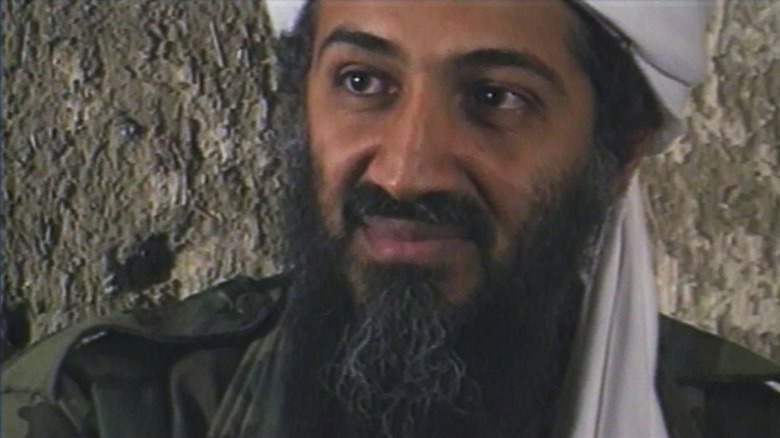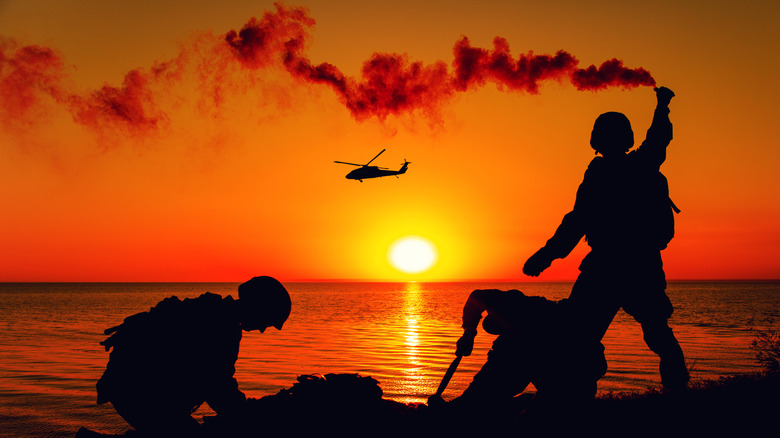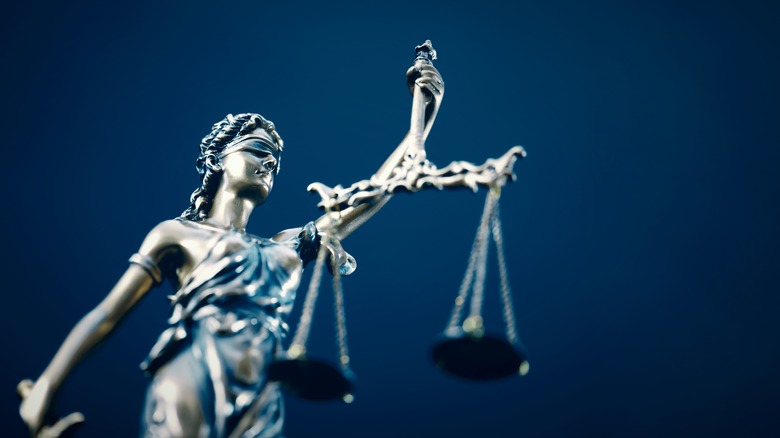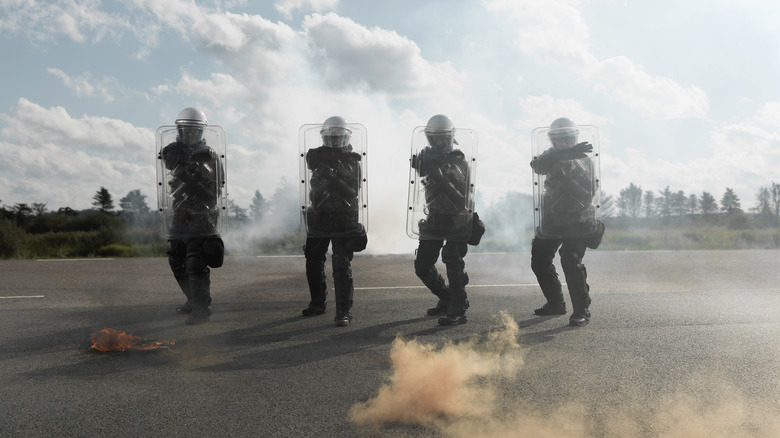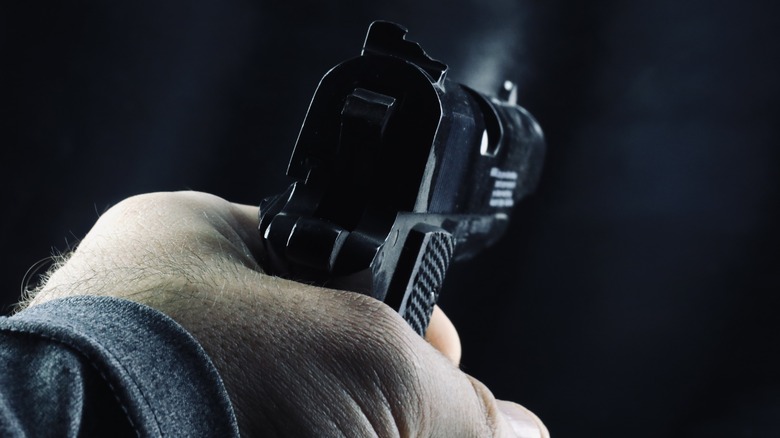What If Osama Bin Laden Had Been Captured Alive?
It's been over 13 years since President Barack Obama strode up to a podium in the East Room of the White House on May 2, 2011 and announced that al-Qaeda terrorist leader Osama bin Laden was dead. Amidst broader U.S. global military actions to "disrupt, dismantle, and defeat" bin Laden's terrorist network, as the White House Archives quotes him, Obama had instructed then-CIA director Leon Panetta to track down and make the "killing or capture" of bin Laden a priority. SEAL Team Six infiltrated the militant leader's Abbottabad, Pakistan compound, he died in the firefight, and his body was dumped in the northern Arabian Sea to avoid his burial site becoming a rallying point for his followers.
While it's hard to imagine a world where the 9/11 World Trade Center terrorist attacks didn't happen, it might be equally tough to imagine what might've happened if Osama bin Laden didn't die back in 2011. It stands to reason that if he was caught he would have stood trial. But bin Laden ran al-Qaeda in Sudan from 1991, then Afghanistan from 1996, had possibly been planning 9/11 from the late '90s, instigated the attack on U.S. soil in 2001, and by 2011 had been living in Pakistan for about five years. So where would bin Laden have been tried? Under whose laws and following what process? Such questions and many more illustrate precisely how complicated the situation could have gotten, very quickly.
He could have been captured before 9/11 happened
Speculation regarding Osama bin Laden's potential capture has to follow from one initial set of conditions: When and how he was captured. In other words, we don't necessarily need to limit ourselves to imagining that bin Laden might have been captured only on May 1, 2011, the day he was killed, if he'd only thrown up his arms and proclaimed, "I surrender, don't shoot." Depending on intelligence regarding bin Laden's activities, he could have been captured at any point following the terrorist attacks of 9/11 all the way to the present, and under a variety of circumstances.
In fact, bin Laden might have been captured even before 9/11 happened. As The Washington Post says, President Bill Clinton approved his capture in 1998 because the CIA knew he was a potential threat, and the head of state later amended those plans to include killing him. Out of five authorized military operations, at least one aimed to capture bin Laden alive, while one aimed to kill him and three "might have led to his death." But every plan fell through because those involved delayed taking action, which gave bin Laden time to change locations. CIA head George Tenet, in particular, didn't want an international debacle on the U.S.' hands if things went south and civilians got injured, money got wasted, U.S. actions resulted in regional political instability, and, most pointedly, the operation looked like a straight-up assassination. But if bin Laden had been captured before 9/11, history would look very different indeed.
Bin Laden could have been put on trial
It stands to reason that Osama bin Laden would have faced a trial if he'd been captured. However, it's hard to speculate what the proceedings would look like thanks to the vagueness of international law as related to combating terrorists, who straddle the line between military and civilian targets. As organizations like the International Center for Counter-Terrorism say, an international tribunal held in Pakistan, where bin Laden was captured, might have aligned best with principles of international law and justice — legal "justice" being different from the common, moral use of the word. In fact, Pakistan might have been the only choice because the International Criminal Court (ICC) in the Hague, Netherlands — the international governing body that tries individuals — didn't exist until 2002. This means that the World Trade Center attacks of 9/11 couldn't have fallen under the ICC's purview, as Reuters explains.
Regardless, there is historical precedent for the creation of independent tribunals to deal with messy, complex, international situations involving multiple countries and where legal jurisdiction is unclear. World War II, for instance, saw the U.K., U.S., France, and the Soviet Union create the International Military Tribunal (IMT) for the famed Nuremberg trials to try German military leaders. But no matter the specifics of bin Laden's trial, it would have certainly sown absolute chaos unless it was kept secret in a place like Guantanamo Bay. But as the BBC wisely points out, such a trial wouldn't have provided the catharsis and "justice" Americans wanted.
Riots, turmoil, and a possible assassination
If Osama bin Laden had been captured and put on trial, we can be sure that the proceedings would have taken years, if not decades. After all, 9/11 "mastermind" Khalid Sheikh Mohammed — as he called himself — was apprehended way back in 2003 before being held in Guantanamo, charged in 2008, and arraigned in 2011. His trial then took over a decade, only reaching a plea deal in 2024. But as CNN says, all these proceedings happened away from the public eye, involved discussions with family members of 9/11 victims, and were complicated by evidence obtained under torture (i.e., the U.S.' infamous "enhanced interrogation" techniques). And as of this writing, no sentence has been reached for Mohammed or his co-conspirators, Walid Bin 'Attash and Mustafa al Hawsawi. How much more agonized would Osama bin Laden's trial have been?
On top of this, we stated earlier that Americans would have needed a public-facing trial for cathartic purposes. If the U.S. held a tribunal on American soil and not at far-flung Guantanamo, Pakistan, or anywhere else, it seems all but certain that some member of the public would've tried to assassinate bin Laden no matter how tight his security detail. For historical precedent we need look no further than JFK assassin Lee Harvey Oswald, killed by nightclub owner Jack Ruby before his trial could even begin. How many more people would be ranting about bin Laden's trial, even rioting, especially in an age of social media?
Social media fervor
We mentioned social media, which has become such a prominent part of modern life that we'd be remiss not to talk about how it might interact with a potential Osama bin Laden trial. It's not hard to imagine the same kind of quick-blurted rage that circulates everywhere online nowadays and fosters social division surfacing amid such proceedings. But also, think of the ease with which social media and the internet writ large allow for the promulgation of fringe beliefs and conspiracy theories — like 9/11 being an "inside job."
Such conspiracy theories ran rampant following the September 11, 2001 World Trade Center attacks. The BBC says that within hours of the attack, folks were scrambling to online forums to blab about how the whole thing was faked, or staged, or that the U.S. government knew, and so forth. Such musings gave rise to now tried-and-true 9/11 truther taglines like "jet fuel can't melt steel" that have been long-debunked, as Popular Mechanics explains. Some even argue that this environment set the stage for QAnon, COVID-19 conspiracies, the modern re-rise of antisemitism, and more.
At this point, you can probably envision the dangerous, frothing prattle that would likely circulate amongst social media during a bin Laden trial: Bin Laden is a CIA agent. Bin Laden is a patsy. Bin Laden is a hero overthrowing the unremittent evils of the West. And much, much more.
Bin Laden's inevitable execution
Ultimately, and for better or worse in pursuit of international law and justice, it's safe to say that if Osama bin Laden had stood trial, he would have faced one predetermined end: execution. There simply is not a world where he would have been tried and left alive if found guilty, and he certainly would never have been found innocent and released. Even back in 1999, bin Laden was on the FBI's Ten Most Wanted Fugitives list for numerous charges related to U.S. embassy bombings. By October 2001, he was on their Most Wanted Terrorists List. Following the 9/11 terrorist attacks, Cofer Black, former director of the CIA's counterterrorism center, didn't hold back when expressing how he wanted it all to end for the militant leader. "I want Bin Laden's head shipped back in a box filled with dry ice," he said, per the BBC. "I want to be able to show Bin Laden's head to the president."
So no — no scenario exists where bin Laden would live if put on trial. The whole case might have come across as a prolonged pantomime meant to satiate the demands of the greater international community, not all of whom agreed with the decision to kill rather than capture bin Laden. In the meantime, and as we discussed, we probably would have had an angry, divided U.S. public splitting hairs over conspiracies and fostering anti-American sentiment online. So when President Obama delivered his announcement regarding bin Laden's death and said, "Justice has been done"? Perhaps given the alternative, it was at least the better choice.
